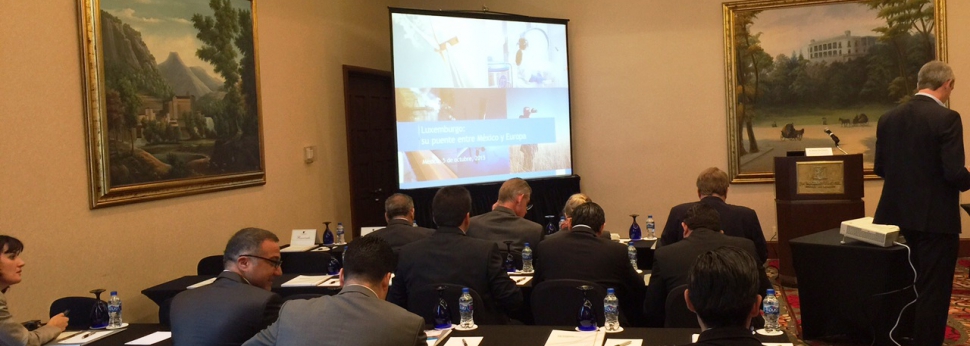MULTISECTORAL MISSION TO MEXICO AND COLOMBIA
The Chamber of Commerce of the Grand Duchy of Luxembourg, with the support of the Ministry of the Economy and the Belgian Economic & Commercial Attachés in Mexico and Bogota, is part of a multisectoral trade mission to Mexico and Colombia from the 4th to the 10th of October 2015. The Cluster and several logistics companies joined the mission that started in Mexico and continues to Bogota on October 6th. The program of the mission includes seminars, tailor-made individual business meetings, official receptions, networking events and company visits. In Mexico several Luxembourg actors take part in a general seminar about Luxembourg and Mexico with focus on ICT, and logistics (check out the pictures).
Pre-arranged individual business meetings with companies organised according to the participant’s requests in close cooperation with Trade and Economic Attachée on the spot. The event in Mexico is also enhanced by a reception offered by the Luxembourg Chamber of Commerce at the Residence of the Belgian Ambassador in Mexico where the Luxembourg participants have the possibilities to meet high level contacts or prospects.
Find out more about the Mexican logistics sector HERE
In Bogota, the Chamber of Commerce delegation will participate in a joint seminar organised by the Ministry of Finance, the Association of the Luxembourg Fund Industry (ALFI) and the Chamber of Commerce, which will be opened by HE Pierre Gramegna, Minister of Finance. A logistics minded seminar and visit to the to the Grupo Andes flowerfarm is planned for the transport community.
Find out more about the Colombian Floral Market HERE
Mexico is the eleventh largest economy in the world (in 2014, the GDP (PPP) was 2 143 billions USD*) with a huge domestic market of 122.3 million inhabitants. For almost 30 years, the country has pursued a path towards greater economic openness (36% of the GDP), focused on the liberalisation of international trade and attracting investment flows. In the meantime, many government-owned companies have been privatised. Today, the country has an attractive business environment, legal stability, free trade agreements with more than fifty countries and competitive labor costs. Huge progress has been made to improve its macroeconomic environment and important structural reforms have been undertaken.
Colombia is the third largest economy, the most business-friendly and the leading reforming country in Latin America according to the Doing Business Report of the World Bank. The country is driven by the size of its domestic market of 47 million inhabitants, various natural resources (minerals, coffee, oil and coal in particular), and by the quality of the workforce. The growth forecasts for Colombia are solid and stable in the long term and are estimated at 4.3% for 2015. It is also one of the few countries in the region that has never been lacking or renegotiated its external debt. The re-election of President Santos in June 2014 ensures the continuity of the major projects launched as part of his first term.








































































































































